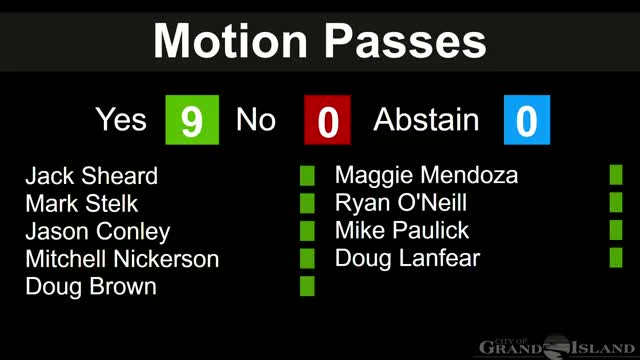Grand Island council approves investment-grade audit to pursue guaranteed energy-savings contract with Honeywell
Get AI-powered insights, summaries, and transcripts
Subscribe
Summary
The City Council authorized an investment-grade audit with Honeywell to study energy and facility upgrades at City Hall, the Heartland Events Center and the public library, with a $220,106 audit fee that would be rolled into any later construction contract if the city proceeds.
The Grand Island City Council voted April 22 to authorize an investment-grade audit with Honeywell Building Technologies as the first step toward a guaranteed energy savings performance contract (ESPC).
Honeywell's preliminary analysis targeted City Hall, the Heartland Events Center and the Grand Island Public Library for potential energy conservation measures and facility improvements. The audit Honeywell will perform — if the council’s action is implemented — is intended to produce engineering-level cost estimates and a guaranteed annual energy-savings number that Honeywell would stand behind during a later construction contract.
Why it matters: Council members and staff said the city has aging building systems and rising utility costs, and that an ESPC could use guaranteed energy savings and other funding sources to pay for required capital work while reducing long-term operating expenses.
Honeywell representatives summarized a preliminary assessment that showed City Hall and the Heartland Events Center notably exceeded Energy Star benchmark energy-use intensities. Jordan Balole, Honeywell local account executive, said the firm would “guarantee these energy savings” through the contract and would act as a single point of accountability for design and construction. Don Borgman, Honeywell’s technical representative, described recommended measures that include LED arena lighting, lighting controls, building-envelope work (window tinting and sealing), retro-commissioning of HVAC controls, boiler and humidifier repairs and selective equipment refurbishment.
Honeywell emphasized the Heartland Events Center's arena lighting and sound system as priorities. The firm described an LED arena lighting upgrade that could remove a 15-minute warm-up delay from the venue’s existing metal-halide fixtures, provide fixture-level dimming and enable color and fan-experience options that Honeywell said could create new event opportunities. Honeywell also recommended repairing boilers and refurbishing air handlers rather than wholesale replacement in several locations.
City administration said the investment-grade audit carries a break fee of $220,106 that would be reimbursed to Honeywell (by being rolled into the eventual construction contract) if the city chose not to proceed to construction after receiving the audit’s final report. City staff clarified the audit’s cost-recovery approach during council questions.
The agenda and staff memo limited the initial audit scope to City Hall, the Heartland Events Center and the library; the Law Enforcement Center (LEC) was excluded pending an amendment to an interlocal agreement with Hall County. City staff said they will pursue that interlocal amendment and then request a contract change if the LEC is to be included.
Venue Works, the new operator at the Heartland Events Center, asked the council to keep an ice-rink repair review in the audit. Tyler Tarwater, Executive Director for Venue Works at the Heartland Events Center, described past successful events that used arena ice — including touring productions — and said making the ice system operable could add community and revenue options. Honeywell estimated the engineering portion of the ice-plant audit at roughly $35,000–$40,000 and said the investment-grade audit can be revised to remove any facility the council does not want evaluated.
Council discussion ran more than an hour, with members praising the depth of Honeywell’s preliminary work and asking about contract length, ongoing upgrades during a long-term partnership and how savings will be measured. Honeywell said contracts commonly include measurement and verification provisions and that energy savings are escalated to reflect expected utility-rate increases; Nebraska law allows ESPC terms up to 30 years, council members were told.
Action and next steps: The council approved the investment-grade audit agreement and instructed staff to work on the interlocal amendment with Hall County so the LEC can be added later if desired. Honeywell said the audit process typically takes up to 90 days and includes 30/60/90 percent milestones and a third-party engineering review of the projected savings before any construction contract.
Council members and Honeywell representatives said they expect the audit to identify a mix of lower-cost, high-payback projects (for example, lighting and controls) to fund or subsidize higher-cost facility improvements using guaranteed savings and available grants or utility incentives.
Ending: With the vote, Grand Island took the first formal step toward a multi-facility energy and capital-improvement plan that officials characterized as designed to reduce operating costs while addressing deferred maintenance and improving facility comfort and event-marketability.
